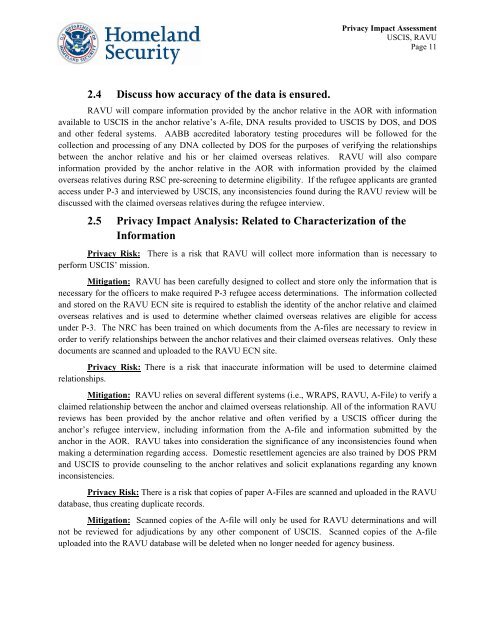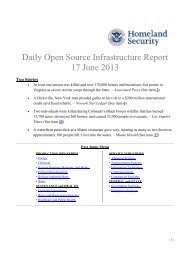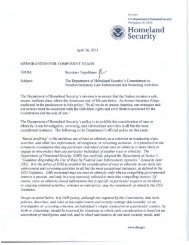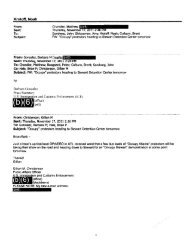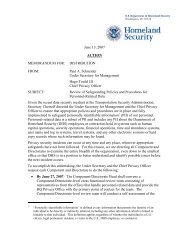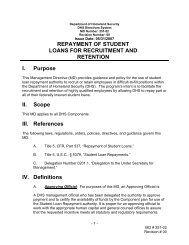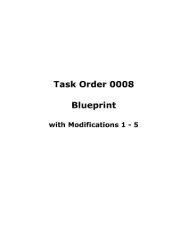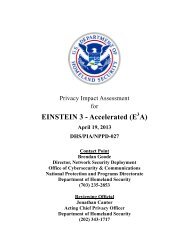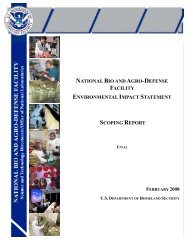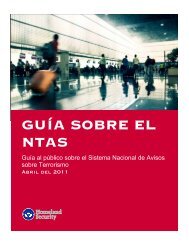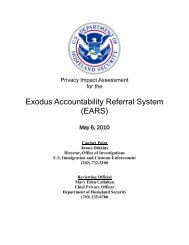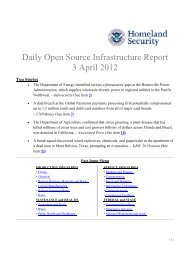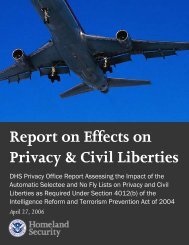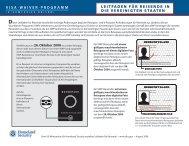RAVU - Homeland Security
RAVU - Homeland Security
RAVU - Homeland Security
Create successful ePaper yourself
Turn your PDF publications into a flip-book with our unique Google optimized e-Paper software.
Privacy Impact AssessmentUSCIS, <strong>RAVU</strong>Page 112.4 Discuss how accuracy of the data is ensured.<strong>RAVU</strong> will compare information provided by the anchor relative in the AOR with informationavailable to USCIS in the anchor relative’s A-file, DNA results provided to USCIS by DOS, and DOSand other federal systems. AABB accredited laboratory testing procedures will be followed for thecollection and processing of any DNA collected by DOS for the purposes of verifying the relationshipsbetween the anchor relative and his or her claimed overseas relatives. <strong>RAVU</strong> will also compareinformation provided by the anchor relative in the AOR with information provided by the claimedoverseas relatives during RSC pre-screening to determine eligibility. If the refugee applicants are grantedaccess under P-3 and interviewed by USCIS, any inconsistencies found during the <strong>RAVU</strong> review will bediscussed with the claimed overseas relatives during the refugee interview.2.5 Privacy Impact Analysis: Related to Characterization of theInformationPrivacy Risk: There is a risk that <strong>RAVU</strong> will collect more information than is necessary toperform USCIS’ mission.Mitigation: <strong>RAVU</strong> has been carefully designed to collect and store only the information that isnecessary for the officers to make required P-3 refugee access determinations. The information collectedand stored on the <strong>RAVU</strong> ECN site is required to establish the identity of the anchor relative and claimedoverseas relatives and is used to determine whether claimed overseas relatives are eligible for accessunder P-3. The NRC has been trained on which documents from the A-files are necessary to review inorder to verify relationships between the anchor relatives and their claimed overseas relatives. Only thesedocuments are scanned and uploaded to the <strong>RAVU</strong> ECN site.Privacy Risk: There is a risk that inaccurate information will be used to determine claimedrelationships.Mitigation: <strong>RAVU</strong> relies on several different systems (i.e., WRAPS, <strong>RAVU</strong>, A-File) to verify aclaimed relationship between the anchor and claimed overseas relationship. All of the information <strong>RAVU</strong>reviews has been provided by the anchor relative and often verified by a USCIS officer during theanchor’s refugee interview, including information from the A-file and information submitted by theanchor in the AOR. <strong>RAVU</strong> takes into consideration the significance of any inconsistencies found whenmaking a determination regarding access. Domestic resettlement agencies are also trained by DOS PRMand USCIS to provide counseling to the anchor relatives and solicit explanations regarding any knowninconsistencies.Privacy Risk: There is a risk that copies of paper A-Files are scanned and uploaded in the <strong>RAVU</strong>database, thus creating duplicate records.Mitigation: Scanned copies of the A-file will only be used for <strong>RAVU</strong> determinations and willnot be reviewed for adjudications by any other component of USCIS. Scanned copies of the A-fileuploaded into the <strong>RAVU</strong> database will be deleted when no longer needed for agency business.


